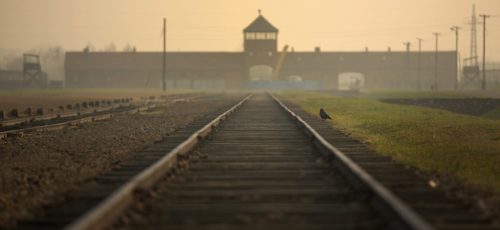Ahead of international conference in Jerusalem, two rival camps of genocide scholars are at each other’s throats, including accusations of anti-Semitism and debates over the Holocaust
BY RAPHAEL AHREN
Times of Israel
June 26, 2016
http://www.timesofisrael.com/academics-go-to-war-over-the-study-of-mass-killings/
Remember the Jew who was stranded on a deserted island and built two synagogues: the one in which he worships and one in which he will never step foot?
It is hard to not think of this old joke in light of the ongoing spat between two rival camps of genocide scholars. This feud, which focuses on the question of how to best to study the Holocaust, is likely to reach new heights (or lows) this week with an international conference held in Jerusalem, which is hosted by one group and denounced by the other.
If the issue at hand — people’s unabating tendency to systematically massacre each other — wasn’t so tragic, the current academic controversy over it would almost be comical.
Mixing scholarly debate with nasty ad hominem attacks, the latest episode in this saga revolves around an Israeli scholar named Israel Charny. A co-founder of the world’s first association for genocide scholars, Charny is now accusing the competitor organization of marginalizing the Holocaust, delegitimizing the State of Israel and overall latent anti-Semitism.
Charny even conducted research — including hiring a surveying company — to demonstrate the other genocide scholars group’s alleged bias. The accused academics retort that his study on their alleged biases doesn’t stand up to scientific standards, questioning Charny’s scholarly credentials.
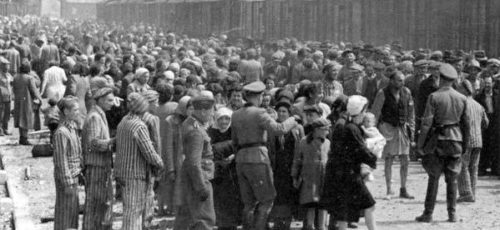
Hungarian Jews on the Judenrampe (Jewish ramp) after disembarking from the transport trains at Auschwitz-Birkenau, May 1944. To be sent rechts! – to the right – meant the person had been chosen as a laborer; links! – to the left – meant death in the gas chambers. (From the Auschwitz Album)
The term “genocide” was first used in 1944 by Polish-Jewish lawyer Raphael Lemkin to describe the Nazis’s mass killing of European Jews. Exactly 50 years later, in 1994, the International Association of Genocide Scholars (IAGS) was founded.
A clinical psychologist by training, Charny served as IAGS’s president from 2003 to 2005. He has edited the Encyclopedia of Genocide and is currently the director of the Jerusalem Institute on the Holocaust and Genocide.
Charny, a native New Yorker who immigrated to Israel, has been an outspoken advocate for the recognition of the Armenian genocide, criticizing the Israeli government for condemning Holocaust denial while at the same time putting realpolitik considerations (mostly relations with Turkey and Azerbaijan) ahead of the moral duty to recognize the mass murder on Armenians between 1915 and 1923.
About a decade after IAGS was founded and grew into the world’s largest collective of genocide scholars, a rival organization was set up in Berlin. According to its website, the International Network of Genocide Scholars (INoGS) champions “research-led analysis rather than politically defined policy agendas,” considering itself part of a “non-partisan community.”
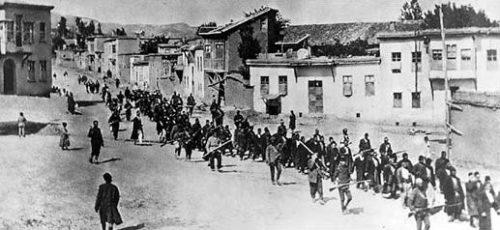
Armenians are marched to a nearby prison in Mezireh by armed Turkish soldiers, 1915. (Artaxiad, Wikimedia Commons)
On Sunday, its conference will kick off at Jerusalem’s Hebrew University, featuring as top speakers Adama Dieng, the special adviser on the prevention of genocide to UN Secretary-General Ban Ki-moon and Harvard historian Charles Maier.
The participation of a senior UN official has sparked ire among pro-Palestinian activists, which has since mobilized against the conference, with partial success. This episode illustrates beautifully how any event dealing with Israel, or merely taking place there, is liable to be criticized both for being anti-Israel and too pro-Israel at the same time.
‘Minimizations of the Holocaust, delegitimizing Israel, anti-Semitism’
In light of INoGS’s planned gathering in Jerusalem, IAGS’s Charny penned an article in the Journal for the Study of Anti-Semitism in which he attacks INoGS’s scholarly publication, the Journal of Genocide Research (not to be confused with IAGS’ Genocide Studies and Prevention: An International Journal).
“In recent years there are many articles in which there have been minimizations of the significance of the Holocaust, statements delegitimizing the State of Israel and by implication possibly an aura of anti-Semitism,” Charny charges.
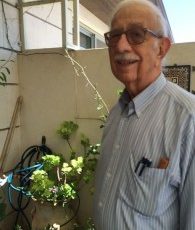
Israel W. Charny (Karen Wolberger)
Several articles in INoGS’s journal place the Holocaust in a “larger perspective” of Nazi Germany’s attempt to dominate Europe, including “its version of colonization.” Furthermore, Charny maintains, the mass murder on the Jews is put in contexts of “local and regional patterns of oppression and the killing of many minorities.” These articles thus suggest, Charny argues, that Jewish victims of the Shoa were not singled out because of their Jewishness and that there was no systematic effort to annihilate the Jewish people.
“It’s as if to say, ‘So, forgive me, the killing wasn’t really killing, it was an expansion of Germany; the victims weren’t really victims, they were casualties of colonization; the horror was a historic-political-nationalistic enterprise like so many others.’”
Charny cites various articles to prove his point, including one by University of Sussex historian Gerhard Wolf, who wrote last year that the 1942 Wannsee Conference “did not call for a systematic and immediate murder of all Jews.”

Berlin’s House of the Wannsee Conference, where the Third Reich devised the Final Solution in January 1942, is now a memorial and museum. (Courtesy of the House of the Wannsee Conference via JTA)
In 2010, a piece in the journal claimed Zionism “was based on a genocidal ideal” and that the 1948 War of Independence was the “fulfillment of that intention,” Charny writes. The article, by sociologist Martin Shaw, postulated that pre-war “Zionism included the development of an incipiently genocidal mentality towards Arab society.” Shaw is cited as concluding that Israel can only hope for security if it comes “to terms with the genocide of 1948.” (Shaw has replied to Charny’s criticism here.)
Seeking to bolster his claims with hard data, Charny hired an electronic survey company that asked 76 genocide scholars and graduate students to read certain passages from the Journal of Genocide Research and rate their ostensible bias. “Approximately one-third of the respondents judged the journal to be promoting anti-Semitic themes, while more than half — 59% — felt that references to the Holocaust had been minimized, and another 59% noted an anti-Israel bias,” Charny writes.
While acknowledging the study’s “methodological limitations,” Charny concludes that its findings “strongly suggest” that the journal “is pursuing a prejudiced agenda that is professionally unacceptable.”
In late May, Charny took the battle from the pages of a scholarly journal to the mainstream and repeated his claims in an article for the Jerusalem Post. “And now,” he writes there, “to add icing to the cake, the International Network of Genocide Scholars, the journal’s parent organization, is coming to town, holding its international meeting in Jerusalem in June.”
‘Professor Charny has done a service to the profession’
Charny is not alone in feelings that something is wrong with the way INoGS academics approach Israel and the Holocaust.
“Professor Charny has done a service to the profession by highlighting the creeping anti-Israel bias that has not only overtaken global academia, but has now even invaded the field of genocide scholarship,” Gregory Stanton, a former president of IAGS and the founder of Genocide Watch, told the Times of Israel.
Stanton also defended Charny’s methodology, noting that he sent out a questionnaire to an IAGS mailing list and never claimed to have used random sample or other research methods. “He used a neutral third party to tally the results. He got a respectable rate of return, enough to permit statistically significant conclusions,” Stanton argued.
The founder of the Jerusalem Center for Genocide Prevention, Elihu Richter, also supports Charny’s attack on INoGS.
“The examples Charny gives concerning the Holocaust trivialization are potent,” opined Richter, a retired professor at Hebrew University’s School of Public Health and Community Medicine. “The same applies to negative bias towards Israel with regard to events preceding, during and after the 1948 War of Independence — and their contexts.”
In fact, Richter’s criticism goes even further than Charny’s. In studying genocide, INoGS “factors out the role of Moral Agency,” he wrote in a letter to the Jerusalem Post. “Moral Equivalence is the result.”
The upcoming conference does not address Iran and its role in the Syrian civil war, Richter argues, accusing INoGS of “bystanderism” — neglecting Jihadist genocide and cradling “intergenerational incitement” to violence in the Muslim world.
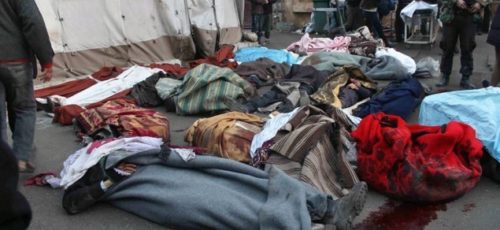
Syrians stand near the bodies of people who were killed by a Syrian government airstrike outside a field hospital in Aleppo, Syria, on December 15, 2013. (AP/Aleppo Media Center)
INoGS scholars were quick to pick up the gauntlet, defending their organization’s philosophy and branding Charny an unqualified troublemaker.
Charny’s allegations are “absurd,” the editor of INoGS’s journal, Dirk Moses, wrote in a letter to the Jerusalem Post. “The methodological flaws his ‘survey’ of his friends are so manifold and egregious that they require no separate refutation. However, to insinuate in public that the Journal’s editors and its authors are anti-Semitic is unfounded and defamatory.”
Moses notes that Charny is “a family therapist, not a historian,” adding that if he was unhappy about the journal he should not write about it in the paper but rather “engage” with the authors at the upcoming Jerusalem conference.

Holocaust scholar Yehuda Bauer (YouTube screenshot)
In addition, a group of 39 scholars, including two past presidents of the American Historical Association and three Hebrew University professors, wrote to the paper that they were “shocked” by Charny’s accusations. “Our field enjoys a range of perspectives and methodological approaches, and this diversity is key to its vitality and continuing relevance,” the letter states.
“We are dismayed by Mr. Charny’s [who is not a Holocaust scholar] partisan orthodoxy that seeks to morally discredit those he accuses of biases — including anti-Semitism. And, although Mr. Charny is no statistician either, he grounds his claims in figures that lend an aura of credibility but in fact mean nothing. Far from advancing scholarship, Mr. Charny chills the room with character assassination.”
In a post to the IAGS mailing list, Timothy Williams, of the University of Marburg, points out that Charny’s survey showed that about 33 percent of respondents felt that the selected passages from INoGS’s journal were anti-Semitic means that 67% — a large majority — think the opposite. “Thus, of the expert opinions collected on this item, two-thirds of respondents, do not agree with this characterization which Israel Charny subsequently takes as demonstrated,” Williams writes.
“This lack of discussion of what the results actually mean fundamentally undermines the paper and makes one feel the author is biased,” Williams continued. Rather than stating that experts consider the journal anti-Semitic, Charny owes readers an explanation why two-thirds of respondents do not hold this view.
The “absurdity” of Charny’s accusations of anti-Semitism and anti-Israel bias becomes evident if one remembers that INoGS is coming to Jerusalem for its annual conference, said Raz Segal, who organizes the event. A look at the program, “makes a hash of any talk of Holocaust minimization,” he told The Times of Israel. Indeed, the word “Holocaust” appears 75 times on the program, a cursory search shows.
Why is Charny so keen on discrediting INoGS and its scholars?
According to Segal, a historian at Tel Aviv University, Charny’s attack is rooted “primarily in his sense of marginalization in Holocaust and genocide scholarship.”
Indeed, Charny’s position reflects “a broader attempt in the last several years to delegitimize a diverse group of scholars whose work raises new questions and suggests new avenues of research on the Holocaust by placing it in broader historical contexts,” he said.
“It is at the very least unfortunate that describing and understanding the Holocaust more in depth is perceived as a threat and leads to the kind of defamation,” Segal added.
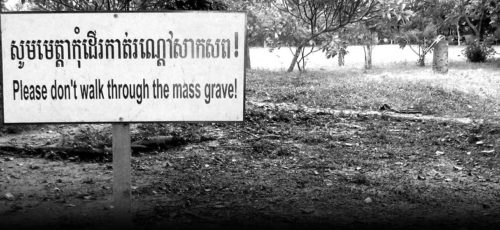
The site of a mass grave in Cambodia (Courtesy: International Association of Genocide Scholars)
In response to the attacks on him that followed his attack on them, Charny insisted that he has long advocated studying the Holocaust “in broad comparative contexts along with study and reverence for the genocides of all peoples.”
Defending his scientific methodology, he noted that an outside surveying company tallied the results to ensure that he “could not touch the data as it came in.” With the Journal for the Study of Anti-Semitism, a “bona fide professional journal” saw fit in publishing his findings, which shows that they stand up to academic scrutiny, he told The Times of Israel.
And yet, despite the malicious rhetoric accompanying the most recent spat between the two rival camps of genocide scholars, this week’s conference in Jerusalem will not turn into the Killing Fields of Cambodia.
For one, the “nasty rivalry” between INoGS and IAGS is no longer as bad as it once was, Segal said. The “situation has improved considerably in the last few years now that Israel Charny is no longer president of the latter,” he explained. Indeed, despite Charny’s ferocious attack on INoGS, he is not boycotting its Jerusalem conference. In fact, he is actively participating, chairing a session on “Genocide Denial and Foreign Policy in Israel.”
The pen might be mightier than the sword, but the wars genocide scholars wage against each other in journals and at conferences, thankfully, have very little in common with the unimaginable horrors of actual genocides.
